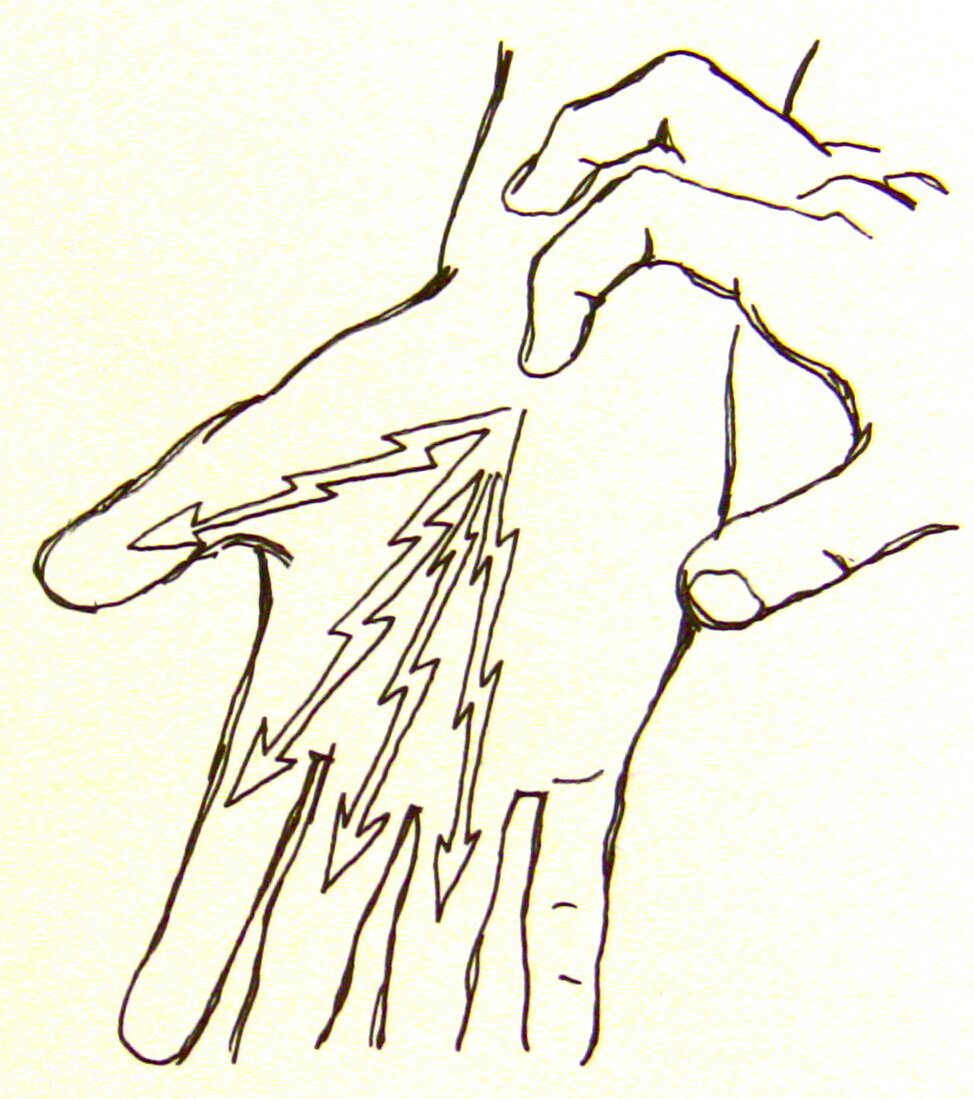Neuropathy, and other nerve disorders
Nerves carry the information our bodies need to function. Signals travel from our brain through our nerves and into organs or muscles telling them when to contract or function. Sensors on the ends of different nerves can sense pain or hot, cold or wet. These sensors initiate signals that are carried by the nerves back to our brains in order to tell us if we stepped into a cold puddle or onto hot coals.
Nerves are like wires. They carry an electrical signal. Unlike wires they are living tissue. Wires are coated with rubber or plastic in order to provide insulation so that the electrical signal is not redirected. Our nerves are covered with special cells that provide insulation and protection.
The nerve pathways in our body are located in areas where they can be protected from trauma and disease. Nerves are resilient and well protected but unfortunately they can become injured or malfunction as a result of several various causes.
drawing by Justin Bean
When injured, nerves can malfunction. A nerve that is not working correctly can cause all sorts of havoc and suffering.
Nerves are sensitive to pressure. They react. When placed under pressure often a message is sent to the brain to “get off “. If an individual is sitting in a way that places a nerve under pressure, they are encouraged to shift their weight or standup in order to relieve the sensations that an unhappy nerve sends. They might even be woken up at a sleep in order to be encouraged to shift positions. Unfortunately for some individuals, their nerve has been placed under pressure as a result of structural changes associated with their spine or other structures associated with the pathways that nerves take. These patients suffer greatly. They are constantly being encouraged to take the weight off of a nerve that is being pinched. Unfortunately no position is comfortable. The nerve is inflamed and until the inflammation resolves, symptoms persist.
drawing by Justin Bean
This is the idea of a pinched nerve. An area in the body has shifted and caused the pathway of a nerve to become compromised. The nerve becomes inflamed and sends signals to the brain in order to encourage the body to away from the painful pinching. If the pressure results from a osseous pathway like the carpal tunnel, or from a chronically spasmed muscle like the piriformis, treatment is indicated. Nerves hate being placed under pressure. Until the pressure is relieved the nerve will likely continue to send signals of pain and paresthesia.
drawing by Justin Bean
In most cases, relieving the pressure on the nerve, by reducing the inflammation that causes swelling and contracture, can allow the neropathy to resolve. In some cases, an intractable structure may impinge on a nerve path causing symptoms that are not adequately relieved until the pressure is removed by surgery. These cases represent the minority.
drawing by Justin Bean
Physical therapists see exercise and stretching as the best way to try and relieve a neuropathy, surgeons think of surgery. Chiropractors manipulate the bones and doctors use medications. This type of neuropathy results from nerves that have been injured as a result of being placed under pressure. Another form of neuropathy exists where the nerves are injured due to another more generalized reason. This may be termed peripheral neuropathy.
drawing by Justin Bean
Peripheral neuropathy is usually bilateral, affecting both sides. It does not result from a nerve being placed under pressure, but due to the fact that the nerves are being injured by virtue of having been exposed to some substance or irritant in the body. Peripheral neuropathy may occur for those for whom their diabetes has been out of control. This causes blood sugar to remain high for significantly long periods of time that it may injury the nerve endings causing chronic symptoms. These symptoms tend to affect the toes and feet first, although the fingertips and hands can also be symptomatic.
drawing by Justin Bean
An individual who is drinking excessively over a long period of time may have damaged their nerve endings or someone undergoing intensive chemotherapy for cancer treatment or other long-term medications can suffer this syndrome. Many patients experience symptoms and after extensive testing are still unaware as to why they developed neuropathy.
drawing by Justin Bean






